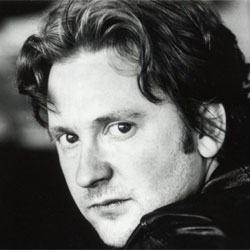Shorter than the blink inside a blink
the National Grid will sometimes make, when you’ll
turn to a room and say: Was that just me?
People sitting down for dinner don’t feel
their chairs taken away/put back again
much faster than that trick with tablecloths.
A train entering the Olive Mount cutting
shudders, but not a single passenger
complains when it pulls in almost on time.
The birds feel it, though, and if you see
starlings in shoal, seagulls abandoning
cathedral ledges, or a mob of pigeons
lifting from a square as at gunfire,
be warned, it may be happening, but then
those sensitive to bat-squeak in the backs
of necks, who claim to hear the distant roar
of comets on the turn – these may well smile
at a world restored, in one piece; though each place
where mineral Liverpool goes wouldn’t believe
what hit it: all that sandstone out to sea
or meshed into the quarters of Cologne.
I’ve felt it a few times when I’ve gone home,
if anything, more often now I’m old,
and the gaps between get shorter all the time.
Notes on the Poem
"Paul Farley is a poet of wit, sensuality and warmth. His work engages with the commonplace and the overlooked, the absurd and the catastrophic, the scientific and the mythic, in ways that make us stop and think again about what it is to be living in this particular world, at this particular moment in our history." So observed the Griffin Poetry Prize judges in their citation for Paul Farley's 2007 shortlisted collection Tramp in Flames, from which the poem "Liverpool Disappears for a Billionth of a Second" comes. We're keen to visit it, in all its intriguing renditions, again this week. "Shorter than the blink inside a blink" is about as laser sharp a focus on the moment as you can get, isn't it? Not only is Farley's incisive look at and pointed call to be conscious of the moment startling and powerful, but it's fascinating to discover that he has interpreted his own poem several times. The evolution and cumulative effect of those interpretations over time will intrigue and haunt you. Farley's first presentation of this poem to make it online appeared on Youtube in late 2009. In a brief companion interview clip, Farley discusses how his hometown of Liverpool continued to be a "work in progress", and the city's "filmic" qualities made itan arresting backdrop for the poem. His words in the interview are kinetic, with an eagerness to depict the city's energy visually that comes through in the poem video. In impenetrable sunglasses, Farley has an insouciant demeanour, and he delivers the poem in a cocky, bemused fashion with just an undertone of ... hmm, perhaps menace? Two years later, this rendition of the poem appeared: It might come as a surprise to discover during the video's credits that Farley also presents the poem here. Not only is his voice disembodied, but it's notably hushed. By comparison, he sounds ... awestruck? sinister? older and wiser? It's strikingly different than the first version. Late in 2015, a new version of the poem became available: Farley gazes directly into the camera - contrast that to his sunglasses in the original video - and his delivery is crisp and confident. This is a picture of a poet who has lived for a few years with a signature and evocative poem within which he's had room to grow and, in a way, extemporize the performance without changing the original words. Is the feeling that perhaps the "gaps between" have indeed become "shorter all the time" ...?
